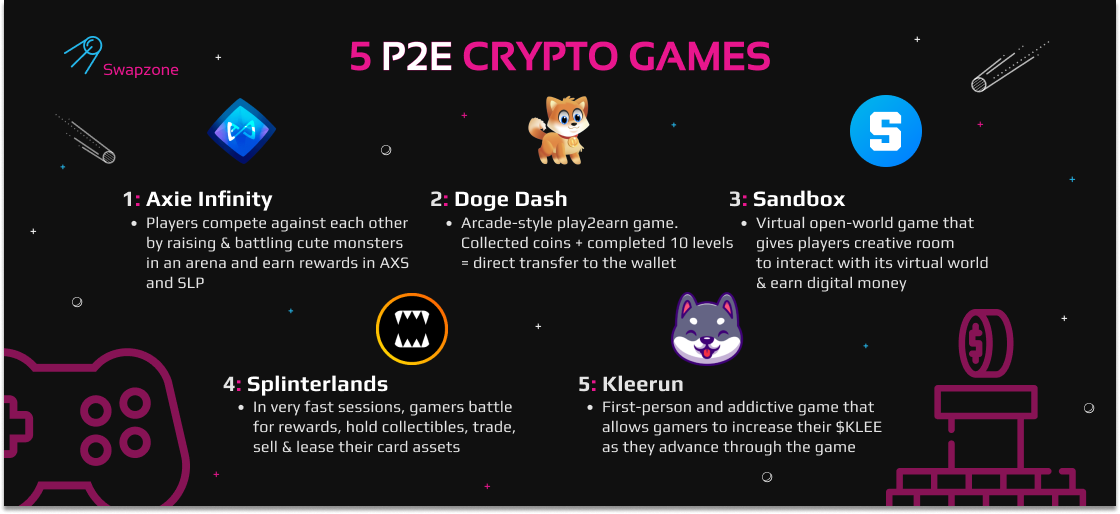Play to earn rewards and transform your gaming hobby into a profitable experience
Play to earn rewards and transform your gaming hobby into a profitable experience
Blog Article
Why Play-to-Earn Benefits Are Changing the Method You Play and Earn
The emergence of play-to-earn designs represents a notable shift in the video gaming landscape, welcoming players to discover not just the entertainment worth of games yet likewise their prospective as income-generating platforms. Recognizing these characteristics increases important inquiries regarding the future of pc gaming and the ramifications for both gamers and programmers alike.
Appearance of Play-to-Earn Versions
Recently, the pc gaming industry has witnessed a considerable makeover with the development of play-to-earn designs, fundamentally modifying exactly how players engage with digital settings. This ingenious approach allows players to obtain tangible benefits via their in-game tasks, developing a change from conventional pc gaming standards where enjoyment and competitors were the key inspirations.
Play-to-earn versions take advantage of blockchain innovation and non-fungible symbols (NFTs) to give players with possession of in-game possessions, which can be traded or cost real-world money. As a result, players are incentivized to invest time and effort right into games, promoting a feeling of agency and financial possibility. play to earn rewards. This shift has actually brought in a diverse gamer base, consisting of those who might have formerly viewed gaming as a simply recreational task
Several systems have actually emerged, showcasing successful implementations of this version, such as Axie Infinity and Decentraland. These systems have not just created significant profits however likewise triggered conversations around the sustainability and principles of such financial systems. As play-to-earn designs continue to advance, they promise to redefine the partnership in between players, designers, and the wider electronic economy, leading the way for a new age in video gaming.
Advantages for Players
As gamers involve with play-to-earn models, they open a range of benefits that expand beyond mere amusement. Unlike standard pc gaming, where gamers spend time and cash without substantial returns, play-to-earn systems permit players to earn copyright or in-game properties that can be transformed to real-world worth.
Furthermore, play-to-earn models promote community structure among players. Players often work together to achieve common objectives, consequently cultivating social links that improve the overall experience. This feeling of community can cause cooperative gameplay, where gamers share techniques and sources, enhancing both individual and group achievements.
Moreover, these versions can democratize access to gaming by permitting gamers from varied economic histories to profit financially. By getting involved in play-to-earn environments, people can gain abilities and knowledge about blockchain innovation, further expanding their profession chances in the expanding electronic economy. Inevitably, the benefits for gamers extend pop over to these guys well beyond gameplay, impacting their social, economic, and educational landscapes positively.
Challenges in the Environment
While the play-to-earn community provides considerable chances, it is not without its challenges. Fluctuations in value can deter potential players who seek steady revenue streams.
One more challenge is the danger of scams and deceptive systems that can pester the environment. Players may encounter deceptive systems promising high rewards but ultimately resulting in financial loss. Ensuring trust and security is crucial for the long-term stability of play-to-earn models.
Furthermore, visit the website the environmental influence of blockchain pc gaming can not be forgotten. The energy usage related to mining and deal handling increases ethical questions concerning sustainability. Game designers must locate a balance in between satisfying gamers and minimizing eco-friendly impacts.
Last but not least, the regulatory landscape is still advancing, posing possible threats for developers and players alike. Uncertain legal frameworks can hinder innovation and limit the growth of play-to-earn environments. Resolving these challenges is vital for recognizing the full possibility of this transformative pc gaming paradigm.
The Function of Blockchain Innovation
Blockchain innovation serves as the foundation of the play-to-earn ecosystem, resolving many of the obstacles previously laid out. By making use of decentralized journals, blockchain guarantees transparency and protection in transactions. Players can confidently earn and trade in-game possessions, recognizing that ownership is proven and exempt to adjustment.

Tokenization of assets plays an essential function, providing players real ownership of their in-game things, which can be acquired, offered, or traded on different industries. This urges a dynamic second market, where players can monetize their skills and time spent in the game.
Furthermore, blockchain innovation makes it possible for interoperability between different games and platforms, enabling gamers to carry their assets throughout various ecosystems. This versatility not just boosts individual experience however likewise advertises an extra inclusive gaming atmosphere, ultimately reshaping the landscape of gaming and earning.
Future Fads in Gaming
The pc gaming sector moved here is on the verge of a transformative development, driven by arising modern technologies and moving player expectations. As play-to-earn designs gain traction, players are increasingly looking for immersive experiences that mix amusement with tangible rewards. This shift is prompting developers to introduce, focusing on developing interesting gameplay that fosters neighborhood and interaction.
One significant fad is the integration of virtual reality (VIRTUAL REALITY) and enhanced truth (AR), improving the video gaming experience by providing much deeper immersion and interactive atmospheres. In addition, advancements in artificial knowledge are enabling extra innovative non-player personalities (NPCs) and adaptive gameplay, tailoring experiences to specific gamer preferences.

Final Thought
In verdict, the play-to-earn design is dramatically changing the pc gaming landscape by allowing players to obtain real-world value from their in-game tasks. This standard shift not just enhances gamer interaction and financial investment yet additionally elevates challenges that have to be dealt with to make certain sustainability within the ecosystem. As blockchain modern technology proceeds to facilitate ownership of electronic assets, the future of video gaming promises additional technology and possibilities for gamers across diverse histories.
Report this page